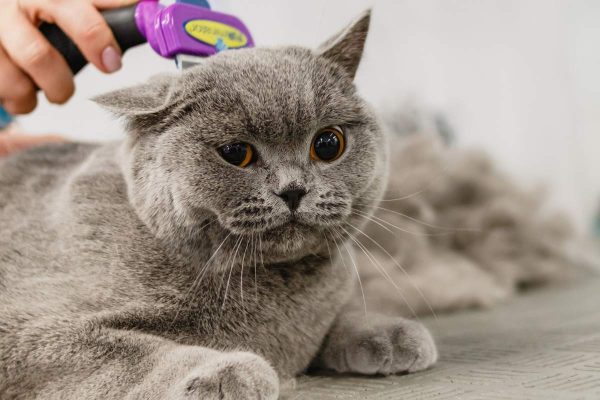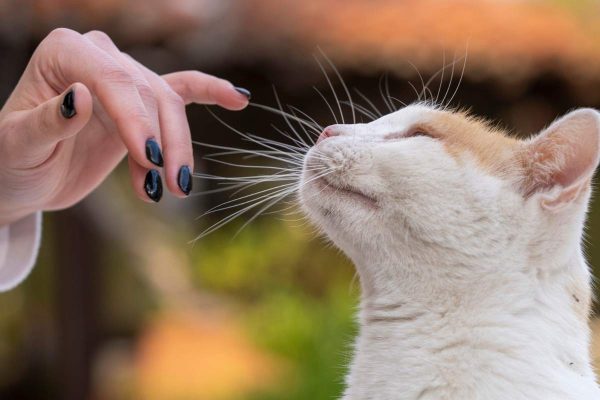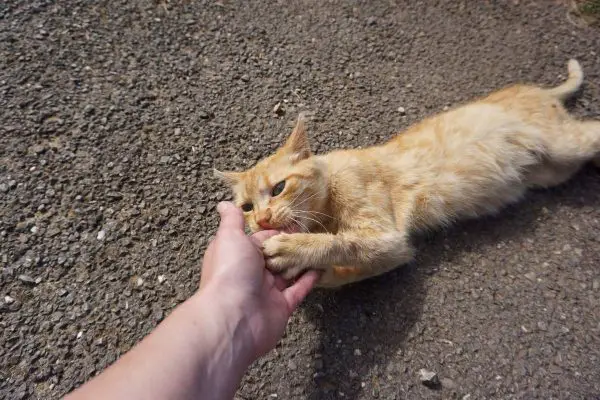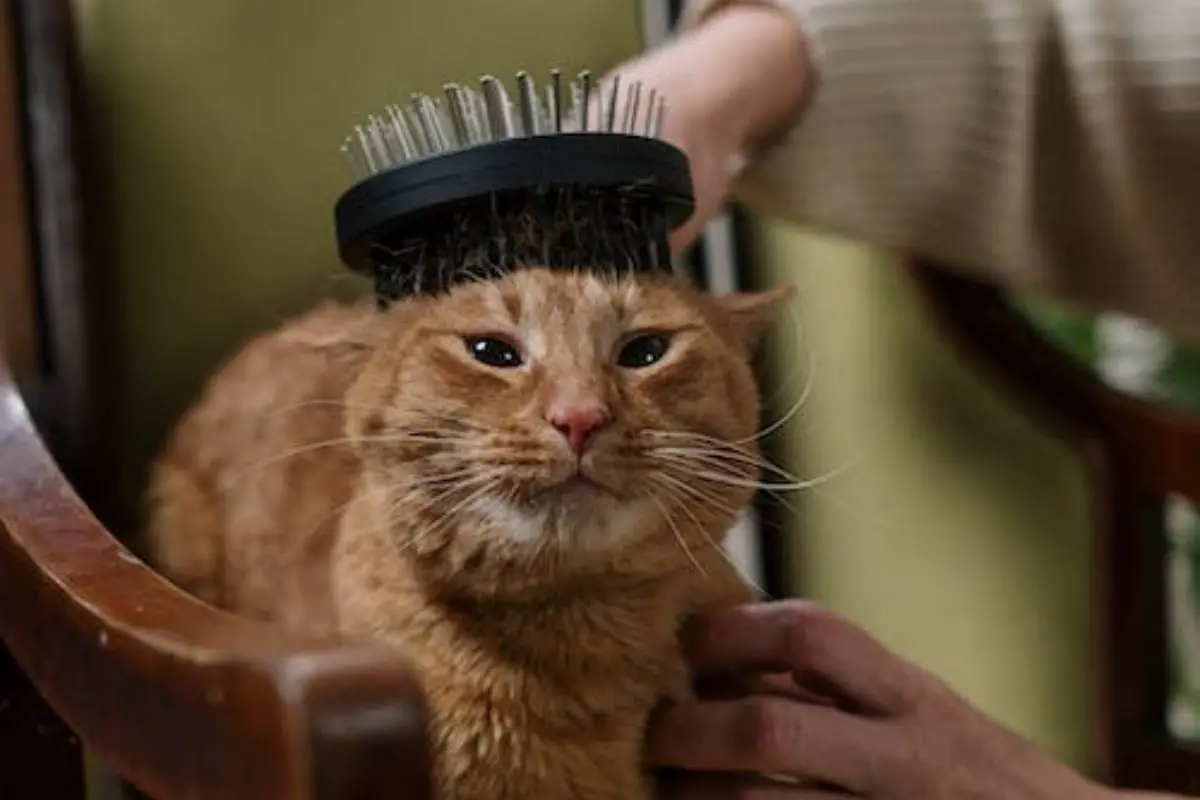Cats can be skittish creatures, and they’re quite particular about when and where they like to be petted. So, if you’re noticing that your cat is ducking down each time you go to pet it, there could be a variety of reasons for it. In this post, we’ll be going over what some of the most likely scenarios are, as well as how you can adjust to make it so you and your cat are as comfortable as possible.
So, why does my cat duck when I try to pet her? It’s likely that your cat is ducking because they’re either startled by your hand, nervous, not feeling well, distracted, and so on.
Like humans, there are many reasons a cat may or may not want to be touched at a given moment. However, if you find them ducking away from your hand frequently, you may want to consider some of the reasons they’re being stressed by your petting. We’ll go over some of those factors as well as ways to solve them in this post.
Reasons Your Cat May Be Ducking From Your Hand
How Are You Petting Your Cat?

The first factor to consider is the way you’re petting your cat. Cats can be rather fussy about how you stroke them, and if you’re going about it in the wrong way, that could explain what’s making them shrink away from your touch.
If you’re bringing your hand down on your cat from above where they don’t see it coming, they may just be startled. Similarly, if you’re petting your cat when they aren’t expecting it, your hand could be an unwelcome surprise. In these situations, it’s perfectly normal for your cat to start and duck away from the unexpected approach.
It could also mean that you’re too rough or heavy-handed in your touch. This is especially something to look out for if the cat is ducking away from children, as they can often be too rough without meaning to be.
If you’re new to owning a cat, you may not even realize that how you’re petting them is too rough. Let the cat be your guide for this. If you notice them dodging your hand, try being more gentle and see if that makes a difference.
Is Your Cat Not Feeling Like Themselves?
If your cat is usually friendly to petting but then suddenly starts ducking away from your hand, perhaps there’s something wrong with them. If your cat is feeling sore or sick, they might not want to be handled as much.
This isn’t a conclusion you should jump to, though. If your cat is acting normal in other ways, then they’re probably feeling fine.
Is Your Cat Unsettled?
Perhaps your cat is distressed by something else. If there are new people in the house, a new pet, or some other change to their environment, they’re probably just stressed and not in the mood to be petted. Unfortunately for you, this outside factor might not be obvious. It could be a neighbor cat passing outside or any number of small disturbances that put them in a bad mood.
Your Cat May Be Distracted
Cats can become very focused on investigating sights and smells. If they’re trying to concentrate on something across the room, they could see your attempts at snuggles as an unwelcome distraction.
Maybe They’re Just Not in the Mood
Just like people, cats want to be alone sometimes. It’s nothing personal if they duck away from time to time. Just give them some time to themselves.
Do Cats Even Like to Be Petted?

Cats have the unfortunate reputation of being quite standoffish creatures. This is an especially common idea among people who haven’t spent much time with them. After all, they aren’t likely to run up and greet strangers, and sometimes they seem to even avoid their owners.
However, those of us who know and love cats have seen their more gentle side. While they may duck out or retreat sometimes, cats may also curl up in your lap and rub up against you. It just depends on their mood.
We owners love it when our pets are in a more friendly mood. But, you may wonder if they are enjoying the petting and cuddles or merely tolerating it. Well, as long as the affection comes from people the cat loves and in a way that they like, cats enjoy getting attention. In fact, house cats need daily affection to stay happy and healthy.
Petting, scratching, holding, and cuddling your cat will help build a healthy, loving bond between the two of you. It’s especially good to scratch and stroke kittens because the interaction is similar to how their mother would pet and groom them. If you notice your cat ducks when you pet him, consider adjusting your approach to ensure the experience remains enjoyable for both you and your feline companion.
Adjusting Your Approach
The key is petting your cat when they want to be pet, and stroking them in a way they enjoy. Although they may still sometimes avoid your touch due to outside factors, petting your cat in a way they enjoy is sure to decrease how often they dodge your approach.
Where to Pet Your Cat
For the most part, cats like to be petted around their head. Their head, cheeks, neck, ears, and chin are usually their favorite spots. Spots around the face are particularly satisfying for them because they have scent glands around their face simulated by scratching them.
They also may enjoy being petted on their back, chest, or other areas, but starting with the head is a smart way to get them comfortable. Once they start enjoying that, it’s much easier to begin stroking the rest of their body.
Vocal and Visual Warning
When you approach your cat to pet them, make sure they see you coming. If you’re approaching your cat while relaxing, you can make a sound or call out to them so they know you’re coming. Keep your hand where they can see it when you go to pet them.
This way, your cat won’t be startled once you come in contact with them. Cats are more likely to receive your affection warmly when they know it’s coming.
Let Your Cat Lead
When you’re petting your cat, especially if you’re establishing a new relationship with a cat, it’s essential to let them be your guide. You can adjust how and where you’re petting them based on their response. Just like how a cat may duck away from you or even swat at you if they don’t want to be petted, they’ll also give other signs when they do.
Reading Your Cat’s Body Language

The best way to make sure your cat won’t duck away from your hand is to pet them when you can tell they’re in a touching mood. Here are some of the signs you can look out for that they want to be pet or are enjoying the interaction:
- Rubbing up against your legs or nudging you with their head
- Crawling into your lap
- Getting in front of whatever you’re working on to get your attention.
- Purring
- Kneading you with their front paws. This is when they alternate between pushing down and pulling out each of their front paws
- If they are waving their tail gently in the air. You have to pay careful attention to this one because if they’re flicking their tail it’s more likely that they’re irritated
- Licking or grooming you
- Pushing their head up or rubbing against your hand as you pet them. This is also a way your cat can guide your hand to where they want you to pet them
Just like there are signs your cat enjoys the attention you’re giving them, you can also easily see signs when they’re not:
- The most obvious sign that your cat is not enjoying the attention you’re giving them is if they bite at, swat, or scratch your hand
- They could also just be non-responsive. If your cat isn’t purring or acknowledging your attention at all, they may only be tolerating it rather than enjoying it
- And of course, as we’ve been discussing, if your cat ducks or pulls away from your hand, that’s a pretty good sign they aren’t in the mood
- If they hiss or growl
- You may also notice them quickly twitching their tail or head in irritation
Conclusion
So, if you notice your cat ducking out of your reach, it’s most likely nothing to worry about. It doesn’t necessarily mean anything is wrong with them or with you, it more than likely just means that your cat is not in the mood for attention at the moment.
However, if you notice this behavior happening frequently, you can adjust how you’re approaching your cat to make sure petting is not only a comfortable and enjoyable experience for them, but a similar experience for you as well.

